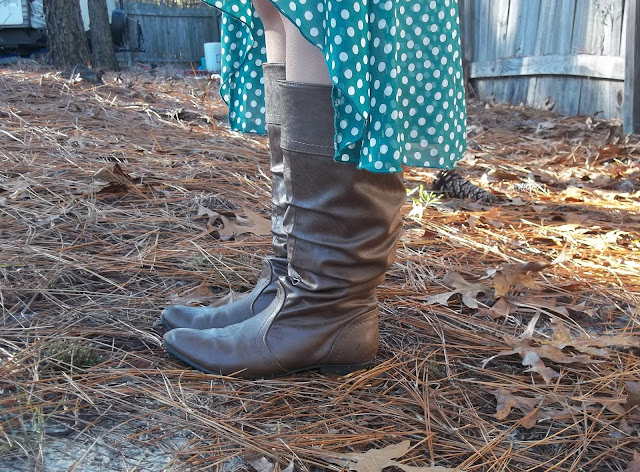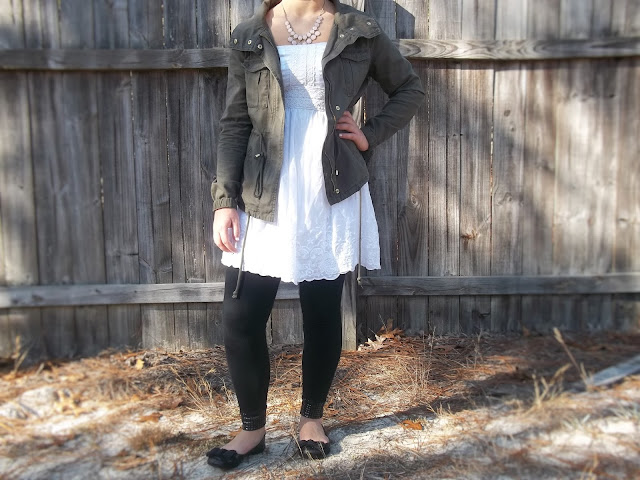Happy Monday! I hope that your weekend was wonderful! Mine was great! Today, I have two outfits with a military jacket, and I have a story about a trafficking victim. I encourage you to read it even if it's difficult.
Outfit details:
Just like this post, this outfit has little bit of girly elements and some that are edgy. I like how it balances all out. These kinds of outfits are my favorite. I also love how the light pink looks with the olive of the military jacket.
Outfit details:
This dress, is my favorite of all of the dresses that I have. I love how loose it is, and the grey color goes with absolutely anything. I love how the military jacket looks with it as well.
At first, I wasn't going to wear leggings with this outfit, but it finally decided to cool down here, so leggings it was.
Here is a story that Dressember has sent me that I would like to share with you:
Charina* is one of the first young women to stand and walk to the front of the room to sign her name to the bill of rights. She is proud of the declarations she and the other girls have written together: "I have the right to be loved. I have the right to live peacefully. I have the right to my own body. I have the right to express my feelings."
Charina, 20, is participating in a meeting with the Reintegration Support Network, a support group for trafficking survivors. The network is an innovative partnership between IJM Cebu and the local government. Government social workers, staff from IJM and volunteers from the community provide medical and psychosocial support. The young women received trauma-focused care in aftercare shelters, and they have now returned to their home communities. The support network offers them a chance to keep learning about topics that promote psychosocial well-being and healthy living.
She was one of two girls rescued in IJM’s first undercover operation in 2007. IJM investigators had been building a case against the pimp, who was notorious for selling young girls to men for sex. Charina was only 15 years old, but she looked even younger. The pimp exploited her youthful looks, selling her for sex to the men who were willing to pay a higher price for younger girls to abuse.
Charina was all too familiar with the routine on the streets. Pimps sold the younger girls and women; prostitutes stood on corners of the street or waited by the pier for customers to drive by to negotiate a price. So Charina thought it was just another night when a pimp told her that she would go to a hotel along with a couple other girls for a private party.
But it was not just another night: The men negotiating with the pimp were undercover police. They were not interested in abusing Charina; they were there to free her.
At first Charina was confused. IJM aftercare staff was on the scene to accompany Charina and the other girls and women to the police station. The IJM social workers explained what was happening and reassured the girls that they were not in trouble. Charina and two of the girls were taken to an aftercare shelter, where they received crisis care and counseling.
But after years of trauma and learning to survive on her own, building trust was extremely difficult.
After her father died when she was a young girl, Charina had been sent to live with her grandmother. Aside from the abusive and angry visits from Charina’s mother, the home was warm and loving – but very poor. Although Charina’s grandmother sold small rice cakes, a popular Filipino snack food, there was never enough.
After completing fourth grade, Charina dropped out of school. Eager for acceptance and desperate for an escape from the hardship that had defined her young life, Charina started hanging out with a rough crowd. These new friends introduced her to drugs, and before long her own mother decided it was time for Charina to start earning some money. Charina was 13 years old when she was first sold for sex. Two years later, she became pregnant and endured a painful miscarriage.
When she was rescued, Charina was three months pregnant, struggling with drug addiction and
very hesitant to receive support from IJM social workers. She saw the rules of the aftercare shelter as a threat to the independence she had been forced to learn at such a young age. She resisted the counselors and attempted to run away.
Despite Charina’s initial resistance, IJM staff remained determined to connect Charina with the resources and services she needed. “We knew we did not want to give up,” says IJM Director of Aftercare Mae Sampani.
IJM was able to place Charina in a detox center, where she received the help she needed to overcome drug addiction. During that time, the team faithfully visited her. They began to see Charina transform. Charina started to believe that someone actually cared for her.
Charina endured many challenges during this time. She had to move to several different aftercare homes. After a fire burned one of the shelters to the ground, Charina moved back to her home community. It was earlier than ideal, but her IJM social worker walked closely with her during the ordeal. After many months of consistent support, Charina started to trust. She overcame her substance abuse and started to rebuild relationships. Charina started to hope.
IJM seeks to provide holistic restoration for trafficking survivors. Social workers help the young women heal by offering practical resources and providing trauma-focused counseling. But there is not one treatment or time line that works for everyone. The social workers make a long-term commitment to each survivor who participates in IJM’s aftercare program, committing to walk the difficult road together.
The men who tried to sell Charina in 2007 were charged under the Philippines’ anti-trafficking law. The trial progressed slowly, illustrating the delays and obstacles that have been endemic to the system—but are slowly starting to change. IJM lawyers have supported the case, persevering through numerous postponed or canceled hearings.
Charina courageously chose to testify in court against the suspects. She is eager to see justice in her case – because she knows she is worth it. The trial finally ended in June 2014 with convictions against the traffickers.
Today, Charina is a strong young mother, determined to give her son the opportunities she should have had herself. With help from her counselors, Charina is making plans to return to school or receive specific vocational training. Charina says she will give anything in her power to protect her son.
At a Reintegration Support Network meeting, Charina stood before the group of other trafficking survivors and counselors. She described how much her life has changed since her rescue. “I am happy and thankful for the positive changes in my life,” she said confidently. “If I was not rescued, I would still be standing over there,” she said, pointing in the direction of the pier where she had once been routinely sold and exploited. Charina described how she has learned to respect others and respect herself. She looked around the room of fellow survivors and said, “Now we can help other girls.”
*A pseudonym has been used for the protection of this IJM client.
This is such a heartbreaking story, but I am so glad that IJM was able to rescue her from this awful lifestyle. I hope that through this story, you have been stirred to donate to help other victims of trafficking. If so, you may donate here with any dollar amount. Every dollar counts.
What do you think?
See where I link up
here.





















































